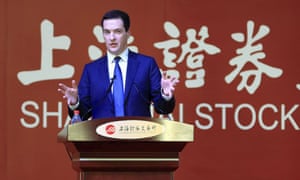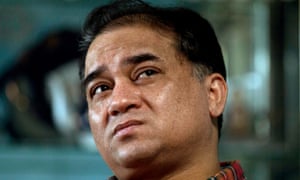The Guardian
By Tom Phillips in Urumqi
Activists call on UK chancellor to speak out during Xinjiang visit and warn ‘you can’t do deals with abusive government without being complicit’
George Osborne risks becoming a Communist party propaganda tool if he travels to China’s violence-stricken north-west and fails to raise concerns over the “severe and striking” human rights crisis unfolding there, activists have warned.
 |
| On a visit to the Shanghai stock exchange, George Osborne told his Chinese hosts: ‘Let’s stick together and make Britain China’s best partner in the west.’
Photograph: Aly Song/Reuters
|
The British chancellor is due to fly to Xinjiang, a volatile region near China’s borders with Afghanistan, Pakistan and Kazakhstan, on Tuesday night. He is expected to voice support for Chinese president Xi Jinping’s so-called “One Belt, One Road” strategy to create a “New Silk Road” economic belt.
Osborne’s visit is part of a five-day tour of China intended to secure investment and cement relations between London and Beijing. On a visit to the Shanghai stock exchange on Tuesday, he told his hosts: “Through the ups and downs, let’s stick together … Let’s stick together and make Britain China’s best partner in the west.”
He added: “We have different political systems. We’re a multi-party democracy. So, of course we will disagree on issues. But let’s conduct our discussion on the basis of the mutual respect of our two great nations.”
Osborne’s decision to visit Urumqi in Xinjiang – a rare destination for western leaders – is controversial and has raised eyebrows among activists and observers.
There have been repeated outbreaks of inter-ethnic violence in the region, which is home to China’s Muslim Uighur minority, amid a security crackdown with activists accusing authorities of systematic human rights abuses.
Ilham Tohti.
Osborne’s visit comes one year to the day after a moderate Uighur academic,Ilham Tohti, was jailed for life for separatism on charges activists believe were politically motivated.
Nicholas Bequelin, Amnesty International’s east Asia director and a Xinjiang expert, said the chancellor had an obligation to speak out against alleged human rights abuses by the government in the region, including “torture, disappearances, a complete denial of religious freedom, freedom of association [and] freedom of expression”.
The UK could show it is on the lookout for economic opportunities but doesn’t sacrifice its principles at the same timeNicholas Bequelin, Amnesty International
He said: “The Chinese government tries hard to project a picture of normalcy in Xinjiang because it serves their purpose in terms of advertising the region as a safe place for economic investment and to push the ‘One Belt, One Road’ strategy. [But] of course Xinjiang is probably one of the worst places in China in terms of its human rights record.
“What would be problematic would be if there was no acknowledgement from the chancellor that this is a region with a particularly striking and severe level of human rights abuses.”
 |
| George Osborne’s visit comes exactly a year after the academic was jailed on separatism charges.
Photograph: Andy Wong/AP
|
Bequelin said that by publicly raising such issues during his visit to Xinjiang “the UK [government] could show that it is on the lookout for economic cooperation opportunities but doesn’t sacrifice its principles at the same time”.
Sophie Richardson, the China director for Human Rights Watch, said: “George Osborne’s visit to Xinjiang coincides not only with a wave of gross repression in the name of countering terrorism but also with the one-year anniversary of the life sentence handed down to Ilham Tohti, a scholar arguably best positioned to address growing tensions in the region.
“Does George Osborne want to be the best friend of people across China [by speaking out against human rights abuses]… or does he want to be the best friend of the Chinese Communist party which is responsible for those abuses?”
The Guardian repeatedly asked Treasury officials if Osborne would publicly raise Tohti’s case or wider concerns over a growing human rights crackdown in China but received no specific response.
In a brief emailed statement, the chancellor said: “We don’t see a choice between securing growth and investment and raising human rights issues. We do both consistently, and indeed I have done so in meetings here in China.”
Speaking on the BBC’s Today programme on Tuesday, Osborne said it was better to engage with China rather than to stand on the sidelines and shout with a megaphone.
China rejects accusations of human rights abuses in Xinjiang and has described Tohti – who some have compared to Nelson Mandela – as an extremist who preached “hatred and killing”.
Xinjiang has long been a restive region where Beijing has been accused of human rights abuses and implementing policies that discriminate against Uighurs in favour of a growing wave of Han Chinese migrants.
One of the most notorious incidents came in 1997 when a deadly riot broke out in a city in west Xinjiang called Yining or Ghulja. In 2009, at least 197 people died when inter-ethnic riots broke out in Urumqi, a city of about 2.5 million inhabitants 1,500 miles west of Beijing.
China launched a “people’s war” on terrorism in May 2014 after dozens were killed in a bomb attack on a market in Urumqi that Beijing blamed on Islamic extremists.
Bequelin said Beijing had legitimate concerns over Islamic terrorism but claimed it was “using a sledgehammer approach to dissent in the region and very often conflates peaceful dissent with advocacy of terrorism”.
The tensions in Xinjiang are immediately apparent in Urumqi, where soldiers carrying riot shields and automatic weapons are stationed outside the airport.
The motorway into the city is lined with red and yellow banners reading: “The party’s great policy is the root of our great life!” and “Unswervingly promote the long-term stability of Xinjiang’s society!” Metal barricades protect the entrances to hotels and shopping centres.
Bequelin warned that by travelling to the region without publicly highlighting Xinjiang’s problems Osborne risked becoming part of “the fictional and manipulative Chinese discourse about what is going on in the region”.
He said: “I would be curious to see what exact economic benefits are being touted by this visit which entails a very high potential risk of presenting the UK as being uncritically supportive of Chinese policies in Xinjiang which are incredibly repressive and may lead to further violence and ethnic polarisation in the future.”
Richardson said a failure by the chancellor to publicly raise human rights issues would show “how craven and cowardly UK policy towards China has become”.
She said Osborne was “duty bound” to speak out over Tohti’s detention and to push Beijing for a radical rethinking of its economic, social and religious policies in Xinjiang, where under-18s are banned from worshiping in mosques. “You can’t show up and do deals with an abusive government without becoming complicit in the abuses yourself,” she said.
Liu Xiaoyuan, a lawyer who has represented Tohti, said international pressure was unlikely to secure his release given the bleak political atmosphere in China. “In the current climate … his release is virtually impossible.” However, Li Fangping, another of the academic’s lawyers, said global condemnation might improve conditions for Tohti in jail.
Bequelin questioned whether Osborne’s decision to travel to Xinjiang was an attempt to “ingratiate” the British government with Beijing. He urged the chancellor not to “walk blindly and naively into a very complex and tense political situation and just pretend that it doesn’t exist”.
He said: “That seems to have been the whole of Osborne’s approach to China: that hubris and sheer willpower can somehow change reality. He seems to be so determined to ignore any kind of information that doesn’t really sit with this happy story of the UK being such a great partner [of China and] finding economic opportunities that are a win-win for everybody.”
It is not clear why Osborne’s delegation chose to visit Urumqi on the one-year anniversary of the jailing of Tohti, who had protested that the Uighurs had been excluded from Xinjiang’s economic boom. The Treasury did not immediately respond to a request for comment on whether British or Chinese officials had selected the date.
Bequelin speculated the choice could be a Chinese attempt to manipulate Osborne’s “willingness to do business at any cost and ignore anything that is unpleasant”.
He said: “What better example of the fact that the west and the UK don’t care at all about human rights than to get the chancellor [to visit Xinjiang] on the very day [Tohti] was unjustly sentenced to life imprisonment for raising issues that are directly related to the economic development of the region?”
Additional reporting by Luna Lin
China Aid Contacts
Rachel Ritchie, English Media Director
Cell: (432) 553-1080 | Office: 1+ (888) 889-7757 | Other: (432) 689-6985
Email: [email protected]
Website: www.chinaaid.org
